Zakat and Taxation: A Comparative Analysis of Poverty Reduction
VerifiedAdded on 2020/05/04
|7
|1511
|335
Essay
AI Summary
This essay provides a comprehensive analysis of Zakat and taxation, exploring their roles in poverty alleviation from an Islamic perspective. It begins by defining poverty and highlighting its global impact, referencing the UN's Millennium Development Goals and the IMF's Poverty Reduction Strategy. The essay then delves into the linguistic and Syariah definitions of Zakat, emphasizing its significance as the second major worship in Islam and its historical effectiveness in combating poverty. It contrasts Zakat with taxation, highlighting their similarities and differences, while both aim to address poverty and social development. The essay outlines the socio-economic benefits of Zakat, including the equal distribution of wealth and improved living conditions for the underprivileged. Furthermore, it details the different categories of Zakat recipients, demonstrating how Islam addresses various sections of society in need of assistance. The essay concludes by emphasizing Zakat's potential, supported by historical evidence, and the importance of collaboration between governmental and non-governmental agencies to reduce poverty effectively.
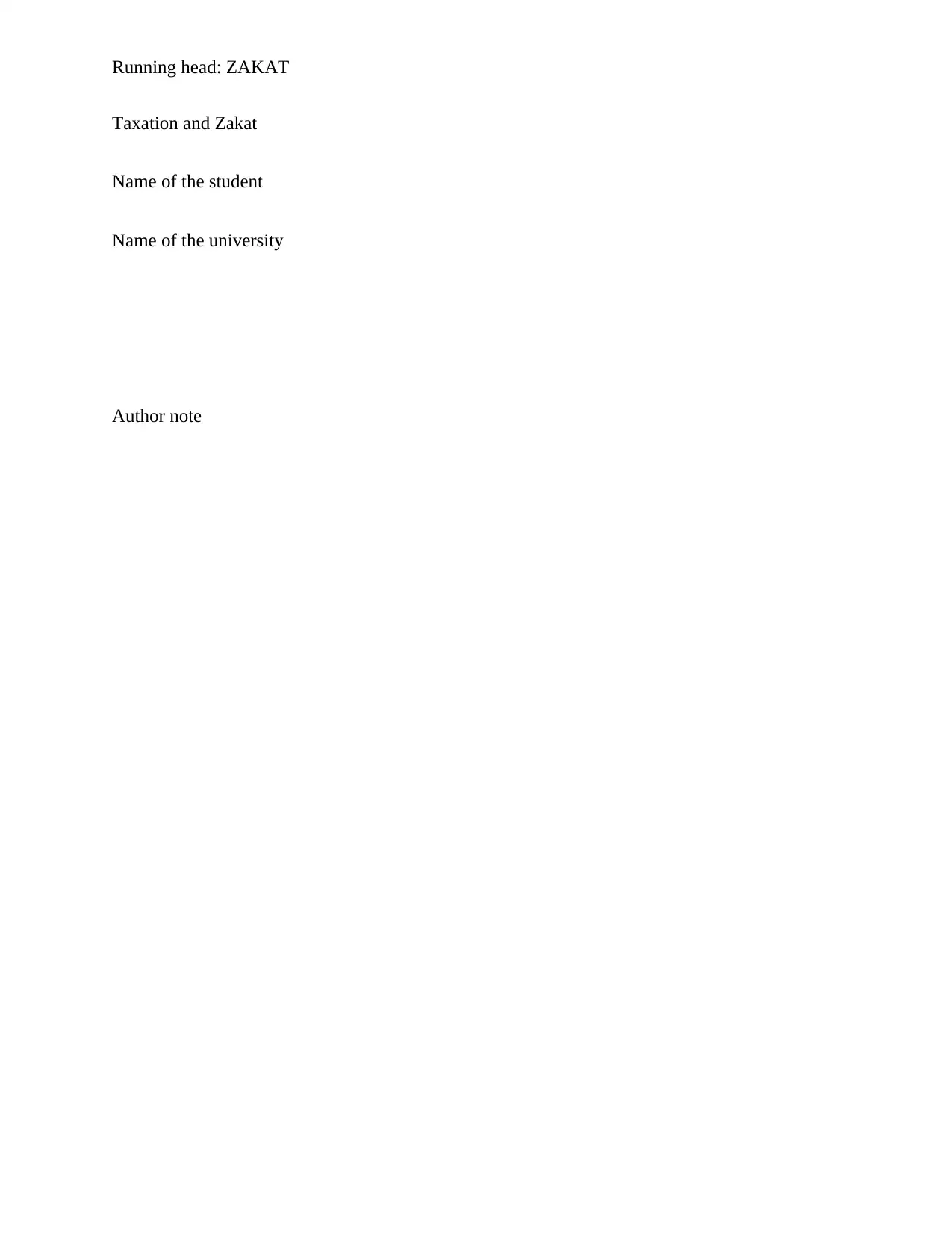
Running head: ZAKAT
Taxation and Zakat
Name of the student
Name of the university
Author note
Taxation and Zakat
Name of the student
Name of the university
Author note
Paraphrase This Document
Need a fresh take? Get an instant paraphrase of this document with our AI Paraphraser
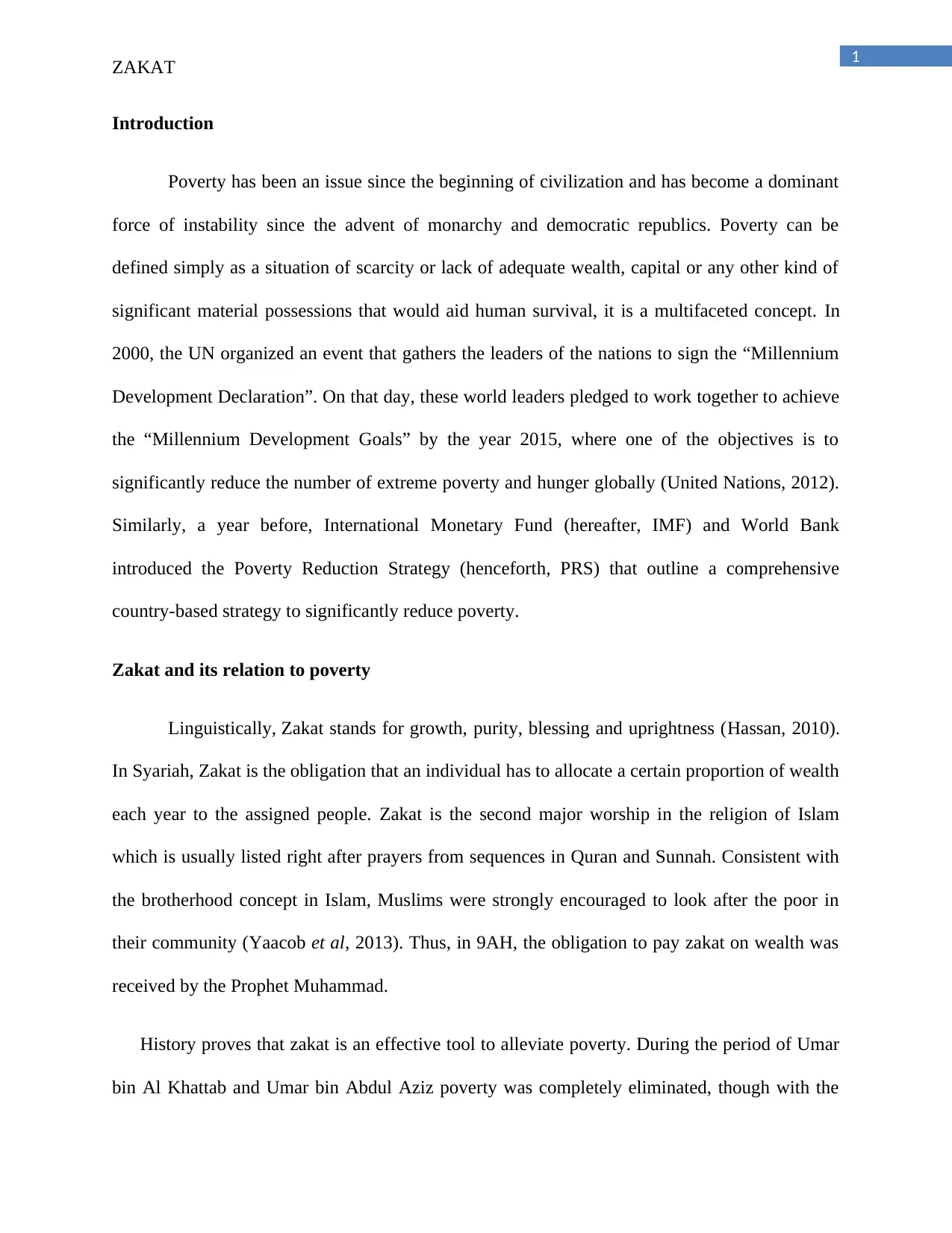
1
ZAKAT
Introduction
Poverty has been an issue since the beginning of civilization and has become a dominant
force of instability since the advent of monarchy and democratic republics. Poverty can be
defined simply as a situation of scarcity or lack of adequate wealth, capital or any other kind of
significant material possessions that would aid human survival, it is a multifaceted concept. In
2000, the UN organized an event that gathers the leaders of the nations to sign the “Millennium
Development Declaration”. On that day, these world leaders pledged to work together to achieve
the “Millennium Development Goals” by the year 2015, where one of the objectives is to
significantly reduce the number of extreme poverty and hunger globally (United Nations, 2012).
Similarly, a year before, International Monetary Fund (hereafter, IMF) and World Bank
introduced the Poverty Reduction Strategy (henceforth, PRS) that outline a comprehensive
country-based strategy to significantly reduce poverty.
Zakat and its relation to poverty
Linguistically, Zakat stands for growth, purity, blessing and uprightness (Hassan, 2010).
In Syariah, Zakat is the obligation that an individual has to allocate a certain proportion of wealth
each year to the assigned people. Zakat is the second major worship in the religion of Islam
which is usually listed right after prayers from sequences in Quran and Sunnah. Consistent with
the brotherhood concept in Islam, Muslims were strongly encouraged to look after the poor in
their community (Yaacob et al, 2013). Thus, in 9AH, the obligation to pay zakat on wealth was
received by the Prophet Muhammad.
History proves that zakat is an effective tool to alleviate poverty. During the period of Umar
bin Al Khattab and Umar bin Abdul Aziz poverty was completely eliminated, though with the
ZAKAT
Introduction
Poverty has been an issue since the beginning of civilization and has become a dominant
force of instability since the advent of monarchy and democratic republics. Poverty can be
defined simply as a situation of scarcity or lack of adequate wealth, capital or any other kind of
significant material possessions that would aid human survival, it is a multifaceted concept. In
2000, the UN organized an event that gathers the leaders of the nations to sign the “Millennium
Development Declaration”. On that day, these world leaders pledged to work together to achieve
the “Millennium Development Goals” by the year 2015, where one of the objectives is to
significantly reduce the number of extreme poverty and hunger globally (United Nations, 2012).
Similarly, a year before, International Monetary Fund (hereafter, IMF) and World Bank
introduced the Poverty Reduction Strategy (henceforth, PRS) that outline a comprehensive
country-based strategy to significantly reduce poverty.
Zakat and its relation to poverty
Linguistically, Zakat stands for growth, purity, blessing and uprightness (Hassan, 2010).
In Syariah, Zakat is the obligation that an individual has to allocate a certain proportion of wealth
each year to the assigned people. Zakat is the second major worship in the religion of Islam
which is usually listed right after prayers from sequences in Quran and Sunnah. Consistent with
the brotherhood concept in Islam, Muslims were strongly encouraged to look after the poor in
their community (Yaacob et al, 2013). Thus, in 9AH, the obligation to pay zakat on wealth was
received by the Prophet Muhammad.
History proves that zakat is an effective tool to alleviate poverty. During the period of Umar
bin Al Khattab and Umar bin Abdul Aziz poverty was completely eliminated, though with the
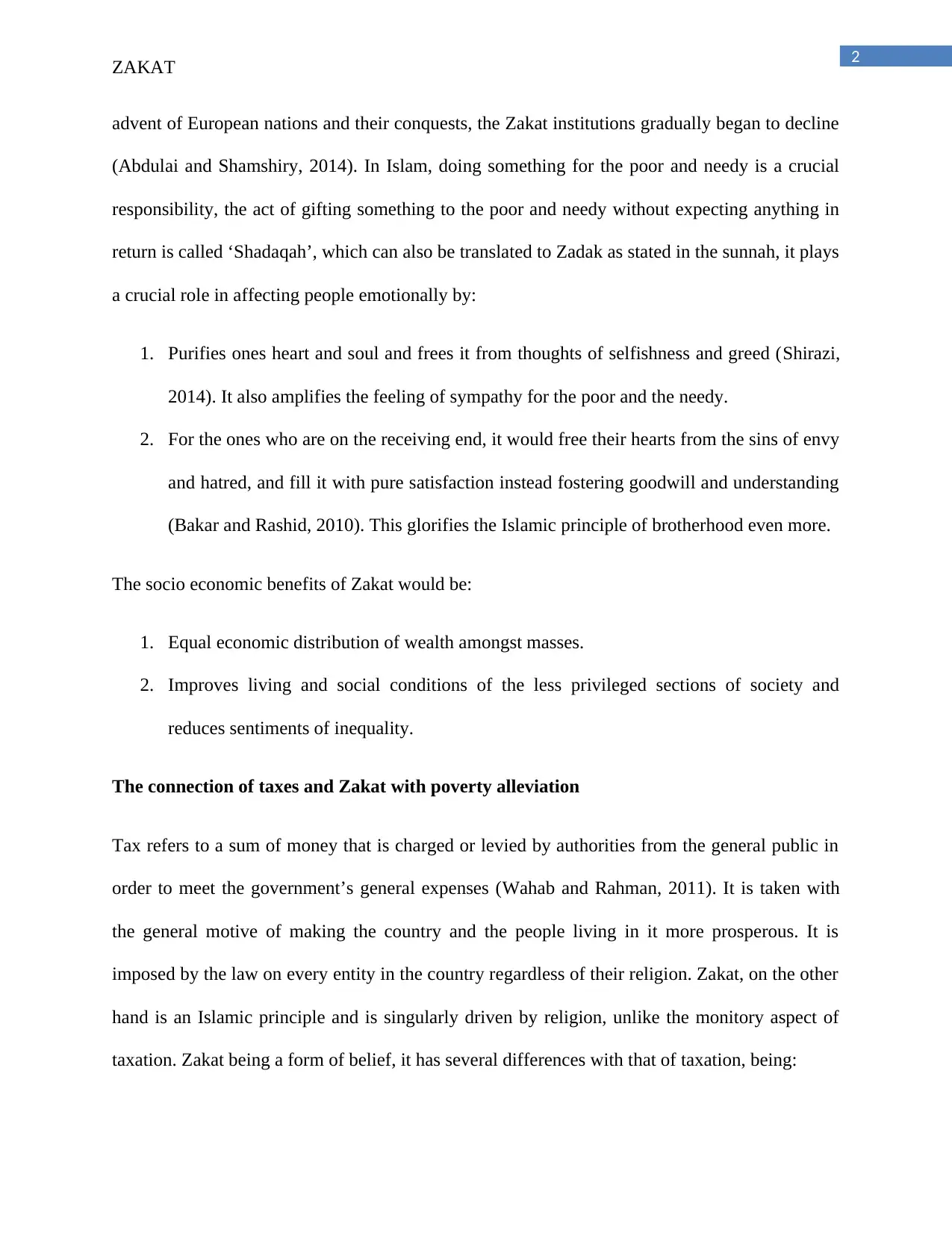
2
ZAKAT
advent of European nations and their conquests, the Zakat institutions gradually began to decline
(Abdulai and Shamshiry, 2014). In Islam, doing something for the poor and needy is a crucial
responsibility, the act of gifting something to the poor and needy without expecting anything in
return is called ‘Shadaqah’, which can also be translated to Zadak as stated in the sunnah, it plays
a crucial role in affecting people emotionally by:
1. Purifies ones heart and soul and frees it from thoughts of selfishness and greed (Shirazi,
2014). It also amplifies the feeling of sympathy for the poor and the needy.
2. For the ones who are on the receiving end, it would free their hearts from the sins of envy
and hatred, and fill it with pure satisfaction instead fostering goodwill and understanding
(Bakar and Rashid, 2010). This glorifies the Islamic principle of brotherhood even more.
The socio economic benefits of Zakat would be:
1. Equal economic distribution of wealth amongst masses.
2. Improves living and social conditions of the less privileged sections of society and
reduces sentiments of inequality.
The connection of taxes and Zakat with poverty alleviation
Tax refers to a sum of money that is charged or levied by authorities from the general public in
order to meet the government’s general expenses (Wahab and Rahman, 2011). It is taken with
the general motive of making the country and the people living in it more prosperous. It is
imposed by the law on every entity in the country regardless of their religion. Zakat, on the other
hand is an Islamic principle and is singularly driven by religion, unlike the monitory aspect of
taxation. Zakat being a form of belief, it has several differences with that of taxation, being:
ZAKAT
advent of European nations and their conquests, the Zakat institutions gradually began to decline
(Abdulai and Shamshiry, 2014). In Islam, doing something for the poor and needy is a crucial
responsibility, the act of gifting something to the poor and needy without expecting anything in
return is called ‘Shadaqah’, which can also be translated to Zadak as stated in the sunnah, it plays
a crucial role in affecting people emotionally by:
1. Purifies ones heart and soul and frees it from thoughts of selfishness and greed (Shirazi,
2014). It also amplifies the feeling of sympathy for the poor and the needy.
2. For the ones who are on the receiving end, it would free their hearts from the sins of envy
and hatred, and fill it with pure satisfaction instead fostering goodwill and understanding
(Bakar and Rashid, 2010). This glorifies the Islamic principle of brotherhood even more.
The socio economic benefits of Zakat would be:
1. Equal economic distribution of wealth amongst masses.
2. Improves living and social conditions of the less privileged sections of society and
reduces sentiments of inequality.
The connection of taxes and Zakat with poverty alleviation
Tax refers to a sum of money that is charged or levied by authorities from the general public in
order to meet the government’s general expenses (Wahab and Rahman, 2011). It is taken with
the general motive of making the country and the people living in it more prosperous. It is
imposed by the law on every entity in the country regardless of their religion. Zakat, on the other
hand is an Islamic principle and is singularly driven by religion, unlike the monitory aspect of
taxation. Zakat being a form of belief, it has several differences with that of taxation, being:
⊘ This is a preview!⊘
Do you want full access?
Subscribe today to unlock all pages.

Trusted by 1+ million students worldwide
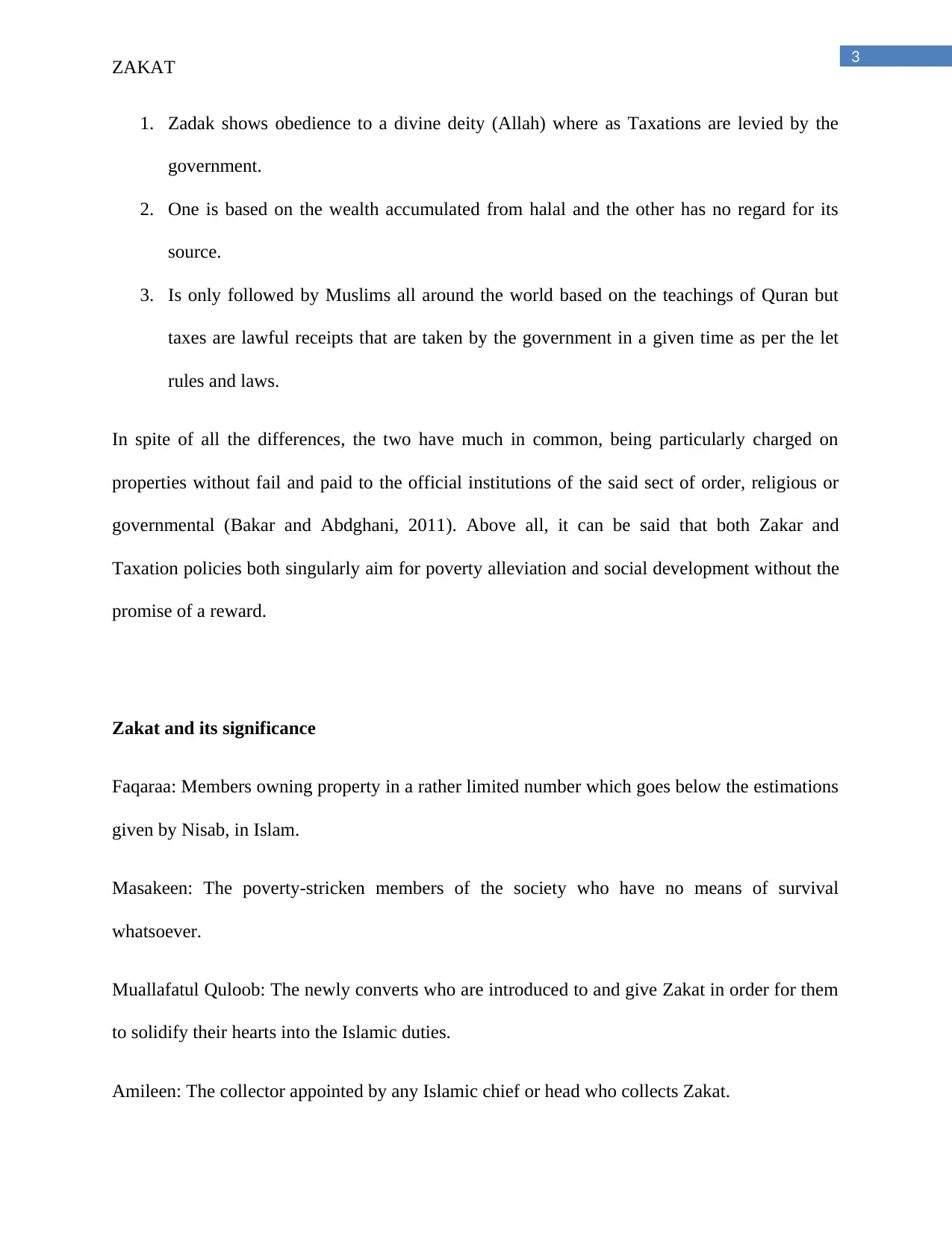
3
ZAKAT
1. Zadak shows obedience to a divine deity (Allah) where as Taxations are levied by the
government.
2. One is based on the wealth accumulated from halal and the other has no regard for its
source.
3. Is only followed by Muslims all around the world based on the teachings of Quran but
taxes are lawful receipts that are taken by the government in a given time as per the let
rules and laws.
In spite of all the differences, the two have much in common, being particularly charged on
properties without fail and paid to the official institutions of the said sect of order, religious or
governmental (Bakar and Abdghani, 2011). Above all, it can be said that both Zakar and
Taxation policies both singularly aim for poverty alleviation and social development without the
promise of a reward.
Zakat and its significance
Faqaraa: Members owning property in a rather limited number which goes below the estimations
given by Nisab, in Islam.
Masakeen: The poverty-stricken members of the society who have no means of survival
whatsoever.
Muallafatul Quloob: The newly converts who are introduced to and give Zakat in order for them
to solidify their hearts into the Islamic duties.
Amileen: The collector appointed by any Islamic chief or head who collects Zakat.
ZAKAT
1. Zadak shows obedience to a divine deity (Allah) where as Taxations are levied by the
government.
2. One is based on the wealth accumulated from halal and the other has no regard for its
source.
3. Is only followed by Muslims all around the world based on the teachings of Quran but
taxes are lawful receipts that are taken by the government in a given time as per the let
rules and laws.
In spite of all the differences, the two have much in common, being particularly charged on
properties without fail and paid to the official institutions of the said sect of order, religious or
governmental (Bakar and Abdghani, 2011). Above all, it can be said that both Zakar and
Taxation policies both singularly aim for poverty alleviation and social development without the
promise of a reward.
Zakat and its significance
Faqaraa: Members owning property in a rather limited number which goes below the estimations
given by Nisab, in Islam.
Masakeen: The poverty-stricken members of the society who have no means of survival
whatsoever.
Muallafatul Quloob: The newly converts who are introduced to and give Zakat in order for them
to solidify their hearts into the Islamic duties.
Amileen: The collector appointed by any Islamic chief or head who collects Zakat.
Paraphrase This Document
Need a fresh take? Get an instant paraphrase of this document with our AI Paraphraser
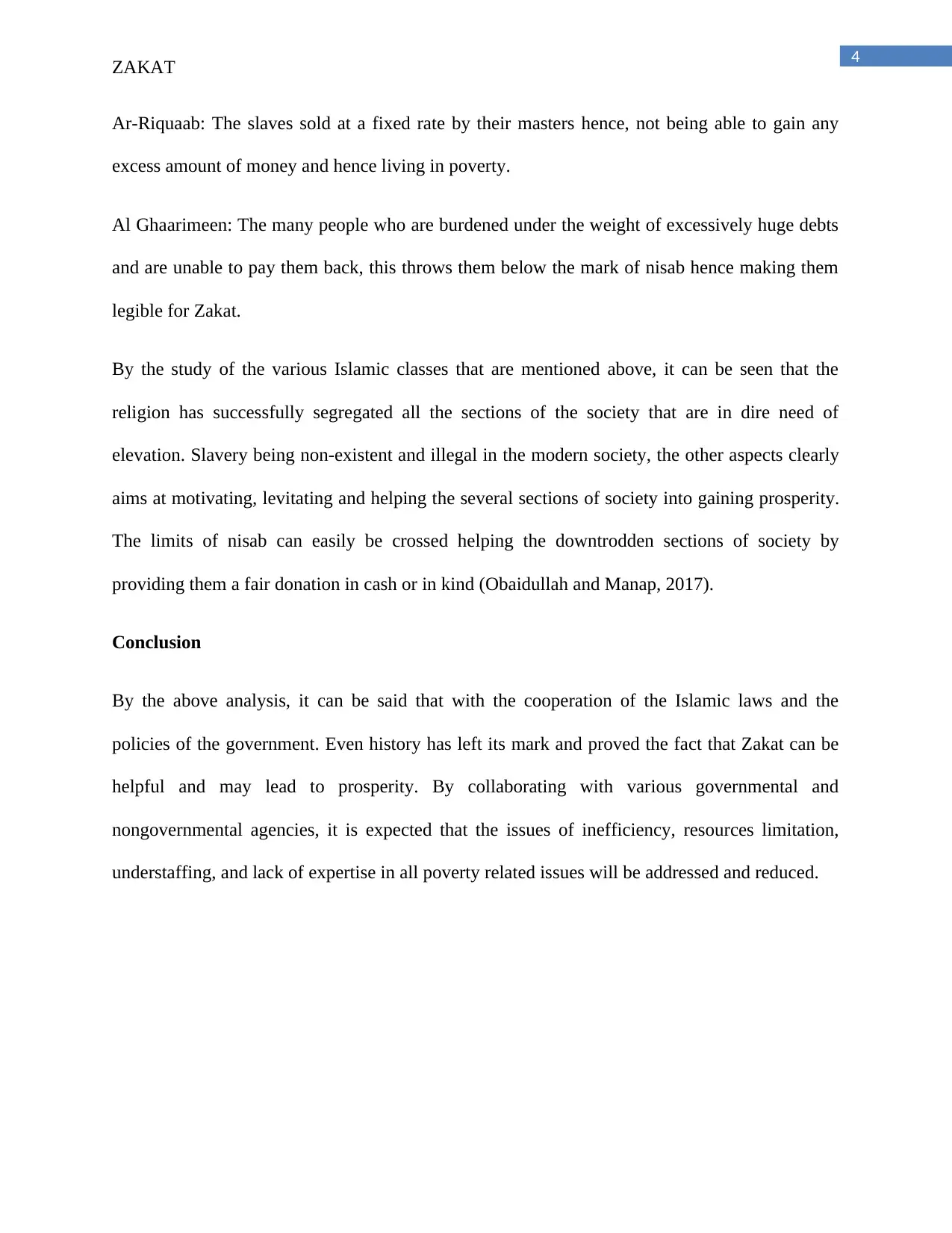
4
ZAKAT
Ar-Riquaab: The slaves sold at a fixed rate by their masters hence, not being able to gain any
excess amount of money and hence living in poverty.
Al Ghaarimeen: The many people who are burdened under the weight of excessively huge debts
and are unable to pay them back, this throws them below the mark of nisab hence making them
legible for Zakat.
By the study of the various Islamic classes that are mentioned above, it can be seen that the
religion has successfully segregated all the sections of the society that are in dire need of
elevation. Slavery being non-existent and illegal in the modern society, the other aspects clearly
aims at motivating, levitating and helping the several sections of society into gaining prosperity.
The limits of nisab can easily be crossed helping the downtrodden sections of society by
providing them a fair donation in cash or in kind (Obaidullah and Manap, 2017).
Conclusion
By the above analysis, it can be said that with the cooperation of the Islamic laws and the
policies of the government. Even history has left its mark and proved the fact that Zakat can be
helpful and may lead to prosperity. By collaborating with various governmental and
nongovernmental agencies, it is expected that the issues of inefficiency, resources limitation,
understaffing, and lack of expertise in all poverty related issues will be addressed and reduced.
ZAKAT
Ar-Riquaab: The slaves sold at a fixed rate by their masters hence, not being able to gain any
excess amount of money and hence living in poverty.
Al Ghaarimeen: The many people who are burdened under the weight of excessively huge debts
and are unable to pay them back, this throws them below the mark of nisab hence making them
legible for Zakat.
By the study of the various Islamic classes that are mentioned above, it can be seen that the
religion has successfully segregated all the sections of the society that are in dire need of
elevation. Slavery being non-existent and illegal in the modern society, the other aspects clearly
aims at motivating, levitating and helping the several sections of society into gaining prosperity.
The limits of nisab can easily be crossed helping the downtrodden sections of society by
providing them a fair donation in cash or in kind (Obaidullah and Manap, 2017).
Conclusion
By the above analysis, it can be said that with the cooperation of the Islamic laws and the
policies of the government. Even history has left its mark and proved the fact that Zakat can be
helpful and may lead to prosperity. By collaborating with various governmental and
nongovernmental agencies, it is expected that the issues of inefficiency, resources limitation,
understaffing, and lack of expertise in all poverty related issues will be addressed and reduced.
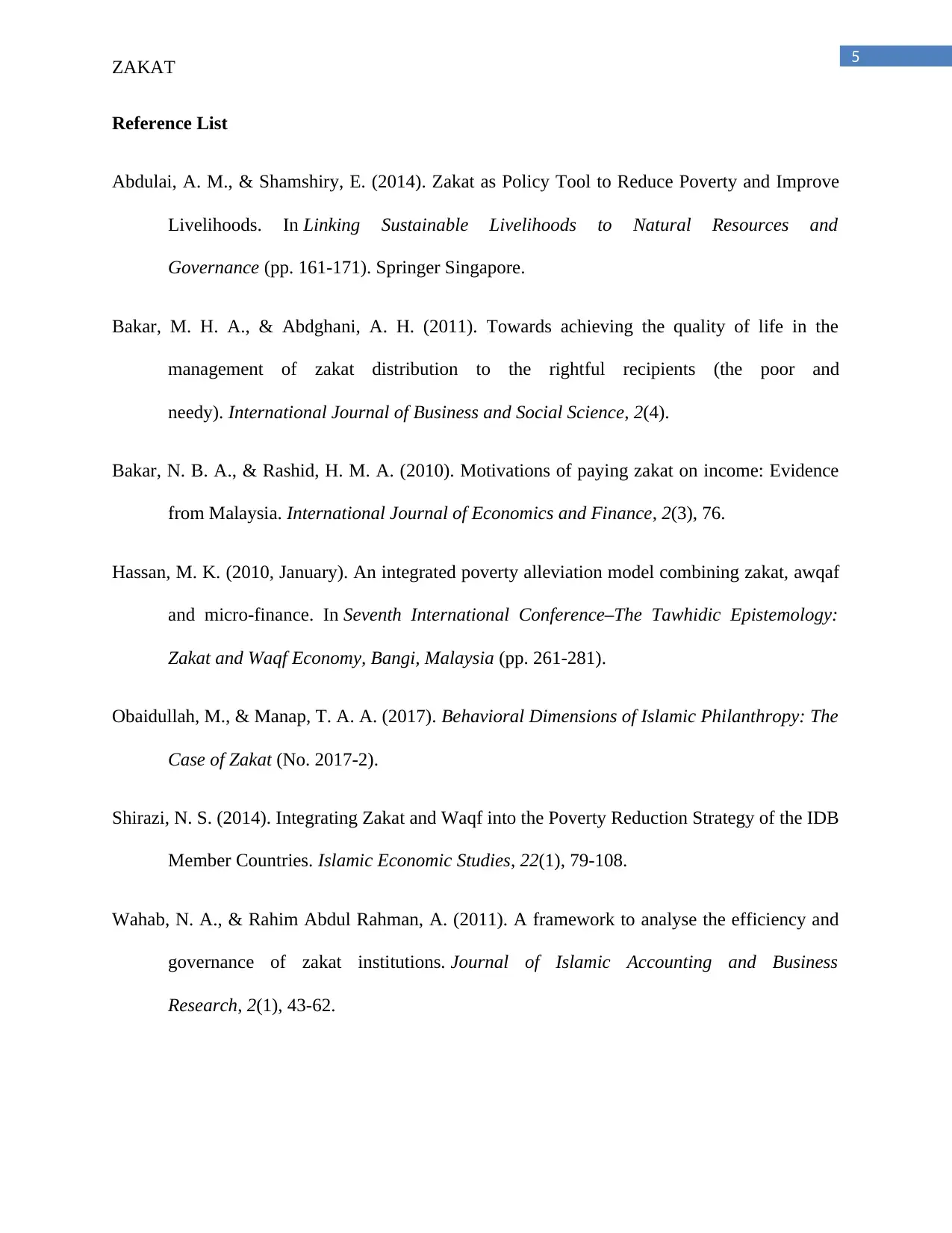
5
ZAKAT
Reference List
Abdulai, A. M., & Shamshiry, E. (2014). Zakat as Policy Tool to Reduce Poverty and Improve
Livelihoods. In Linking Sustainable Livelihoods to Natural Resources and
Governance (pp. 161-171). Springer Singapore.
Bakar, M. H. A., & Abdghani, A. H. (2011). Towards achieving the quality of life in the
management of zakat distribution to the rightful recipients (the poor and
needy). International Journal of Business and Social Science, 2(4).
Bakar, N. B. A., & Rashid, H. M. A. (2010). Motivations of paying zakat on income: Evidence
from Malaysia. International Journal of Economics and Finance, 2(3), 76.
Hassan, M. K. (2010, January). An integrated poverty alleviation model combining zakat, awqaf
and micro-finance. In Seventh International Conference–The Tawhidic Epistemology:
Zakat and Waqf Economy, Bangi, Malaysia (pp. 261-281).
Obaidullah, M., & Manap, T. A. A. (2017). Behavioral Dimensions of Islamic Philanthropy: The
Case of Zakat (No. 2017-2).
Shirazi, N. S. (2014). Integrating Zakat and Waqf into the Poverty Reduction Strategy of the IDB
Member Countries. Islamic Economic Studies, 22(1), 79-108.
Wahab, N. A., & Rahim Abdul Rahman, A. (2011). A framework to analyse the efficiency and
governance of zakat institutions. Journal of Islamic Accounting and Business
Research, 2(1), 43-62.
ZAKAT
Reference List
Abdulai, A. M., & Shamshiry, E. (2014). Zakat as Policy Tool to Reduce Poverty and Improve
Livelihoods. In Linking Sustainable Livelihoods to Natural Resources and
Governance (pp. 161-171). Springer Singapore.
Bakar, M. H. A., & Abdghani, A. H. (2011). Towards achieving the quality of life in the
management of zakat distribution to the rightful recipients (the poor and
needy). International Journal of Business and Social Science, 2(4).
Bakar, N. B. A., & Rashid, H. M. A. (2010). Motivations of paying zakat on income: Evidence
from Malaysia. International Journal of Economics and Finance, 2(3), 76.
Hassan, M. K. (2010, January). An integrated poverty alleviation model combining zakat, awqaf
and micro-finance. In Seventh International Conference–The Tawhidic Epistemology:
Zakat and Waqf Economy, Bangi, Malaysia (pp. 261-281).
Obaidullah, M., & Manap, T. A. A. (2017). Behavioral Dimensions of Islamic Philanthropy: The
Case of Zakat (No. 2017-2).
Shirazi, N. S. (2014). Integrating Zakat and Waqf into the Poverty Reduction Strategy of the IDB
Member Countries. Islamic Economic Studies, 22(1), 79-108.
Wahab, N. A., & Rahim Abdul Rahman, A. (2011). A framework to analyse the efficiency and
governance of zakat institutions. Journal of Islamic Accounting and Business
Research, 2(1), 43-62.
⊘ This is a preview!⊘
Do you want full access?
Subscribe today to unlock all pages.

Trusted by 1+ million students worldwide
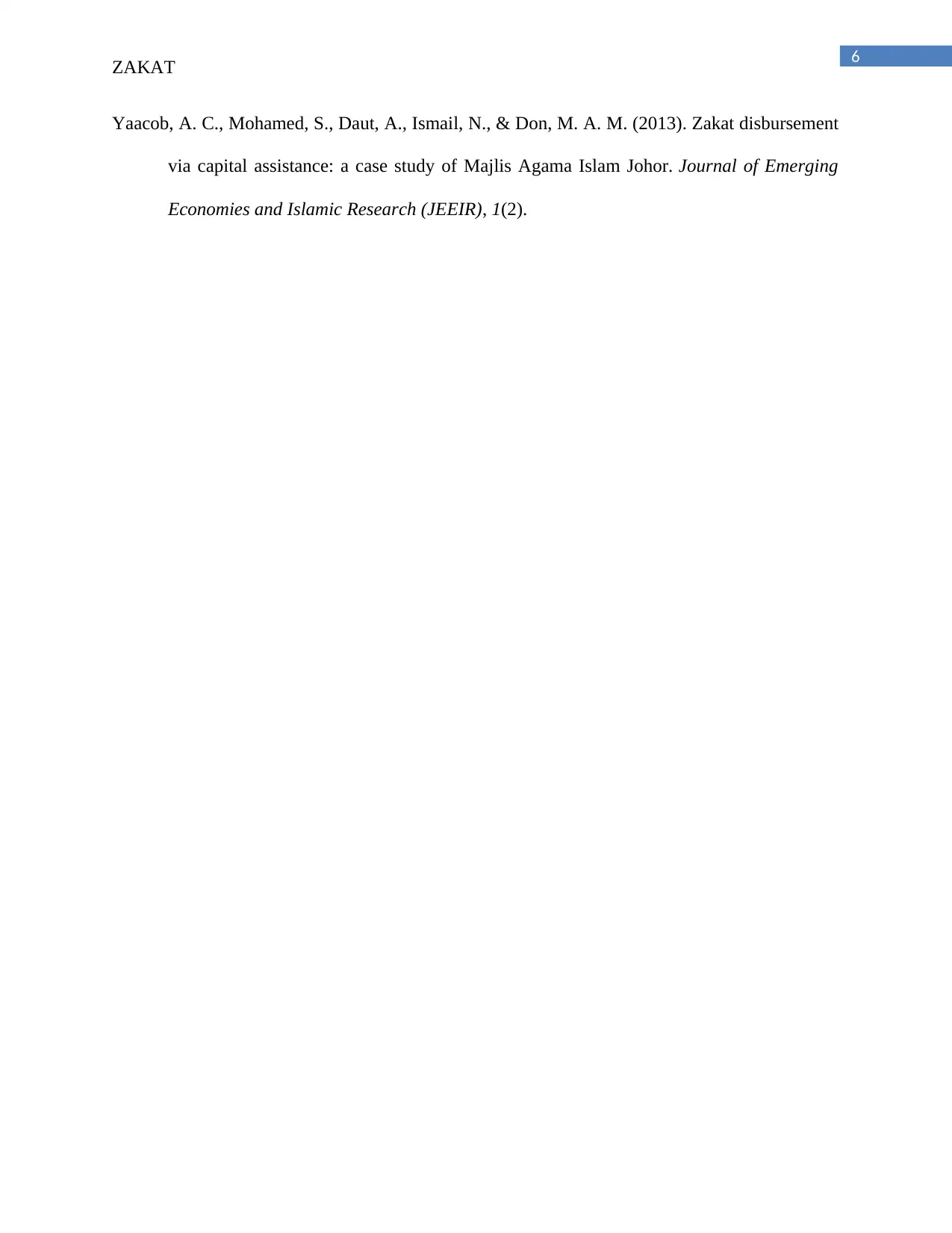
6
ZAKAT
Yaacob, A. C., Mohamed, S., Daut, A., Ismail, N., & Don, M. A. M. (2013). Zakat disbursement
via capital assistance: a case study of Majlis Agama Islam Johor. Journal of Emerging
Economies and Islamic Research (JEEIR), 1(2).
ZAKAT
Yaacob, A. C., Mohamed, S., Daut, A., Ismail, N., & Don, M. A. M. (2013). Zakat disbursement
via capital assistance: a case study of Majlis Agama Islam Johor. Journal of Emerging
Economies and Islamic Research (JEEIR), 1(2).
1 out of 7
Your All-in-One AI-Powered Toolkit for Academic Success.
+13062052269
info@desklib.com
Available 24*7 on WhatsApp / Email
![[object Object]](/_next/static/media/star-bottom.7253800d.svg)
Unlock your academic potential
Copyright © 2020–2026 A2Z Services. All Rights Reserved. Developed and managed by ZUCOL.